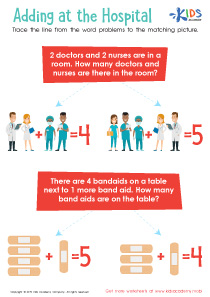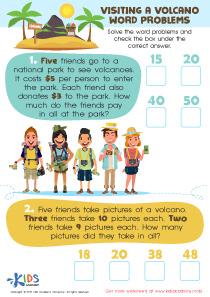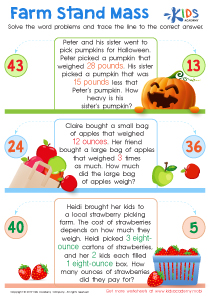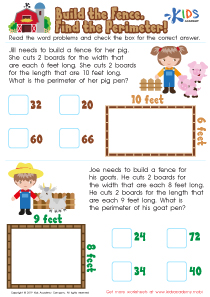Normal Money Word Problems Worksheets for Ages 8-9
1 filtered results
-
From - To
Introducing our Normal Money Word Problems worksheets, expertly crafted for children aged 8-9 years. These learning homework sheets are designed to help young learners master the practical applications of money through engaging and thought-provoking problems. Covering a range of scenarios, these worksheets develop critical thinking and enhance problem-solving skills, making them an invaluable resource for reinforcing classroom learning at home. Each sheet is tailored to challenge young minds at a comfortable pace, ensuring a rewarding educational experience. Dive into our Normal Money Word Problems worksheets and watch your child's confidence and competence with money grow!
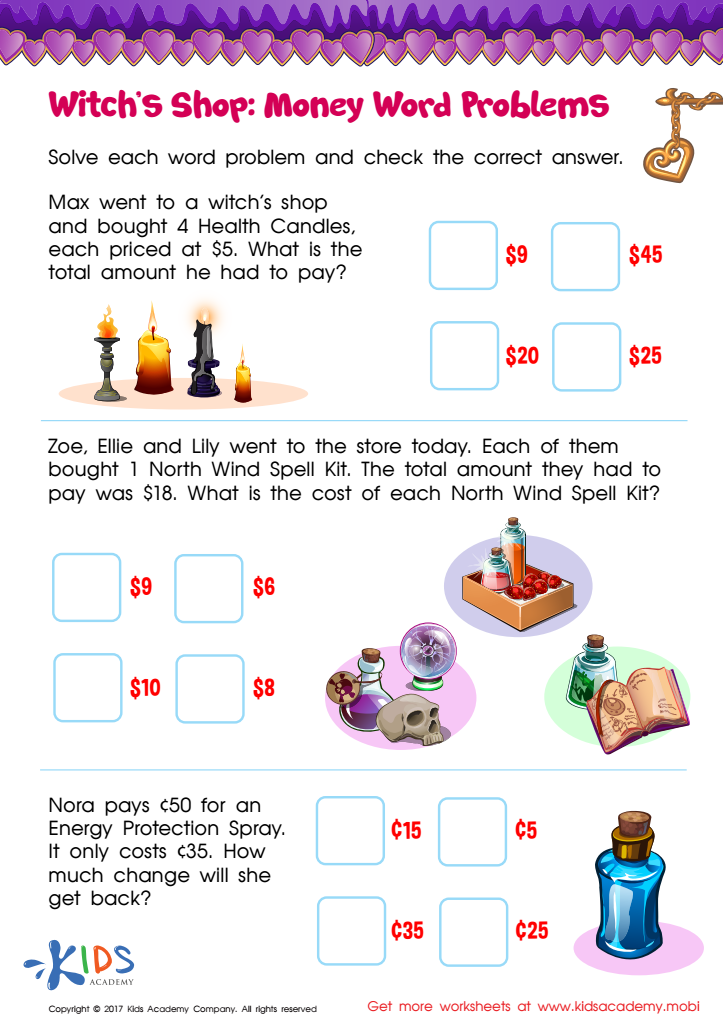

Money Word Problems Printable
Understanding the Value of Educational Worksheets on Money Word Problems for Children Aged 8-9 Years
Educational worksheets, particularly those focused on money word problems, play a pivotal role in enhancing the arithmetic skills and financial literacy of children aged 8-9 years. These worksheets are not just about learning how to count money; they are about understanding real-world applications of mathematics, developing problem-solving skills, and preparing young minds for practical life scenarios.
Educational worksheets designed for money word problems help children to grasp the concept of money, which is a critical life skill. At the age of 8-9 years, children are at a cognitive stage where they can understand more complex ideas, yet they are still young enough that learning through structured activities like worksheets can be highly effective. Money word problems combine basic math operations such as addition, subtraction, multiplication, and division with everyday financial situations. This dual approach not only reinforces math skills but also introduces young learners to essential financial concepts such as spending, saving, and budgeting.
One of the key benefits of using educational worksheets is that they provide a structured learning environment. Children can work through problems at their own pace, which is crucial for building confidence and self-reliance in solving math problems. Worksheets can be repetitive, which helps in reinforcing the concepts being taught. Repetition ensures that children get enough practice, which is essential for mastering any new skill, especially one as foundational as money management.
Furthermore, money word problems in educational worksheets teach children how to apply math in real-life scenarios. For example, a worksheet might present a problem where a child needs to calculate change after buying a toy, or figure out if they have enough money saved up to buy a desired item. These problems help children realize the value of money and understand that math is not just a subject learned in school—it is a tool used in everyday life.
Developing problem-solving skills is another significant advantage of educational worksheets on money word problems. These worksheets challenge children to think critically and creatively. They need to read the problem, understand what is being asked, and decide which mathematical operations to use to find the solution. This process enhances their logical thinking and decision-making skills, which are beneficial not just in math but in all areas of learning and everyday life.
In addition to enhancing academic skills, educational worksheets on money word problems also promote financial literacy from a young age. By engaging with these problems, children learn the importance of money management, the concept of earning, spending wisely, and saving. These are crucial lessons that, when learned early, can set the foundation for responsible financial behaviors in adulthood. As children work through various scenarios on worksheets, they start to understand the consequences of financial decisions, such as what happens when they spend all their money without saving any, or how saving can lead to greater financial security and opportunities in the future.
Moreover, educational worksheets can be a fun and interactive way for children to learn. Many worksheets include colorful graphics, real-life scenarios that kids can relate to, and even games or puzzle-like formats that make learning about money exciting and engaging. This playful approach can help reduce the anxiety some children feel towards math and instead foster a positive attitude towards learning.
Teachers and parents can also use these worksheets as tools to discuss money matters openly with children. This can lead to more in-depth conversations about money, encouraging children to ask questions and express their thoughts or concerns about money-related issues. Such discussions are invaluable as they help children develop a healthy perspective on money and its role in their lives.
In conclusion, educational worksheets on money word problems are incredibly useful for children aged 8-9 years. They not only reinforce essential math skills and introduce important financial concepts but also enhance problem-solving abilities, critical thinking, and responsible decision-making regarding money. By integrating these worksheets into the learning curriculum, educators and parents can provide children with the skills needed to navigate the world with confidence and competence, particularly in financial matters.
 Assign to My Students
Assign to My Students










